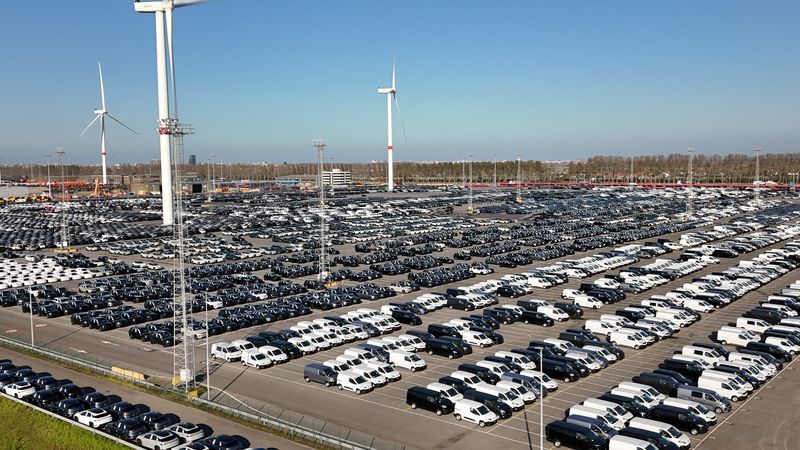By Joe Cash and Laurie Chen
BEIJING (Reuters) – Fears of a widening tariff war between China and other major exporting nations are keeping diplomacy between the world’s second-largest economy and the European Union alive, even as trade talks over electric vehicles stall.
While the U.S. election on Tuesday is almost certain to result in more American curbs on Chinese goods, European negotiators are investing in a longer game that may yield no immediate resolution but would at least stop an escalating trade conflict.
Some EU member states are even using the dispute to bolster bilateral ties away from the Brussels-Beijing negotiations and attract fresh investment from China.
“I don’t think China wants this thing to significantly torpedo the EU-China relationship, especially given the fact we will probably be seeing a very different world (after the U.S. election),” said Bo Zhengyuan, a Shanghai-based partner at Plenum, a consultancy.
New EU tariffs of up to 45.3% on Chinese EV imports came into effect last week after a year-long investigation that divided the bloc and prompted retaliation from Beijing.
Brussels maintains that Beijing doles out unfair subsidies to its auto industry and refuses to accept China’s counter-offer of minimum import prices. Beijing hit back with probes into Europe’s pork and dairy industries and imposed curbs on brandy imports.
Beyond the headlines, however, is a more complicated series of negotiations.
Beijing has in recent months hosted a procession of official visits from the EU and its member states.
A French junior trade minister is visiting Shanghai this week, with Paris keen to continue developing commercial ties in China’s financial capital.
France is also a “Country of Honour” at China’s annual flagship import expo, despite Beijing having placed retaliatory import tariffs on its brandy.
While little progress has been made in even approaching a resolution, engagement remains a priority, analysts say.
“I am not terribly optimistic that the Chinese side will put anything on the table that the EU will accept, but I probably should also be curbing my pessimism a bit, and would not discount a solution,” said Max Zenglein, chief economist at Merics, a Berlin-based China studies institute.
“I am sure certain member states will be pushing for this to demonstrate their willingness or ability to work out a deal.”
A DIVIDED UNION
As Washington steps up its curbs on Chinese products, Beijing is wary of broader damage to its trade ties with the EU, worth $783 billion last year.
For its part, the EU is conscious of widening the division the tariffs have already created among its members.
Among the bloc’s 27 member states, 10 voted for the tariffs, five voted against and 12 abstained. Germany, Europe’s biggest economy, was among the dissenters.
“The definitive lack of a majority against the tariffs meant that some countries’ ‘no’ votes were symbolic,” one European diplomat said.
“Some EU countries want more in-country investment from China and hoped for less retaliation by not voting for the tariffs outright,” they added.
Slovakian Prime Minister Robert Fico is the latest European leader to visit Beijing, seeking deeper two-way trade and investment ties as insurance against a wider fallout with China.
Finland, which abstained, last week also agreed to deepen commercial ties with China during a visit by President Alexander Stubb, following Spain’s and Italy’s lead.
CONSTRUCTIVE MUDDLE-THROUGH
China has incentives to contain the dispute: Its economy is slowing and it needs to find buyers for its EVs to ward off deflationary pressures.
European diplomats, veterans in complex multilateral negotiations that can take years to iron out, said it was clear Beijing wanted to avoid a trade war, but it only started talks with Brussels relatively late in the process.
While both China and the EU have launched challenges against each other at the World Trade Organization, that arbitration could take years.
“Chinese action on brandy, pork and dairy imports from the EU is probably baked in at this point,” said Noah Barkin, senior advisor at Rhodium Group.
“A win for the EU would be Beijing limiting its response to brandy, pork and dairy, and then both sides hashing it out at the WTO,” he added.
Barkin warned a less contained response could see China curb EU access to the critical raw materials it needs for a green energy transition.
During his visit to China in September, Spanish Prime Minister Pedro Sanchez said Spain would seek to resolve the EV dispute within the WTO.
While that would signal a failure of bilateral talks, it would head off a worsening in relations.
“I think there is a chance they will come to some agreement, regarding the minimum prices, but this will not lead to the removal of the tariffs, just a readjustment of the rates,” said Plenum’s Bo on EU talks. “That is probably the best outcome.”

